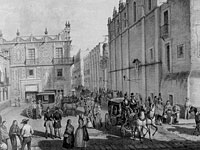Manifest Destiny
An Introduction
 No nation ever existed without some sense of national destiny or purpose.
No nation ever existed without some sense of national destiny or purpose.
Manifest Destiny – a phrase used by leaders and politicians in the 1840s to explain continental expansion by the United States – revitalized a sense of "mission" or national destiny for Americans.
The people of the United States felt it was their mission to extend the "boundaries of freedom" to others by imparting their idealism and belief in democratic institutions to those who were capable of self-government. It excluded those people who were perceived as being incapable of self-government, such as Native American people and those of non-European origin.
But there were other forces and political agendas at work as well. As the population of the original 13 Colonies grew and the U.S. economy developed, the desire and attempts to expand into new land increased. For many colonists, land represented potential income, wealth, self-sufficiency and freedom. Expansion into the western frontiers offered opportunities for self-advancement.
To understand Manifest Destiny, it's important to understand the United States' need and desire to expand. The following points illustrate some of the economic, social and political pressures promoting U.S. expansion:
- The United States was experiencing a periodic high birth rate and increases in population due to immigration. And because agriculture provided the primary economic structure, large families to work the farms were considered an asset. The U.S. population grew from more than five millon in 1800 to more than 23 million by mid-century. Thus, there was a need to expand into new territories to accommodate this rapid growth. It's estimated that nearly 4,000,000 Americans moved to western territories between 1820 and 1850.
- The United States suffered two economic depressions — one in 1818 and a second in 1839. These crises drove some people to seek their living in frontier areas.
- Frontier land was inexpensive or, in some cases, free.
- Expansion into frontier areas opened opportunities for new commerce and individual self-advancement.
- Land ownership was associated with wealth and tied to self-sufficiency, political power and independent "self-rule."
- Maritime merchants saw an opportunity to expand and promote new commerce by building West Coast ports leading to increased trade with countries in the Pacific.
Mexico's Dream of New Spain
 While the United States put into motion a quest for its Manifest Destiny, Mexico faced quite different circumstances as a newly independent country. Mexico achieved its independence from Spain in 1821, but the country suffered terribly from the struggle. The war caused severe economic burdens and recovery was difficult. The fledgling nation's first attempts at creating a new government included placing the country under the rule of an emperor. In 1824, the monarchy was overthrown and a constitutional republic was formed. But internal struggles between the various political factions, such as the Centralist, Federalist, Monarchist and Republican parties, drained even more of the country's energy and resources. These political factions were not united and new struggles broke out by the different sides as each tried to secure dominant rule.
While the United States put into motion a quest for its Manifest Destiny, Mexico faced quite different circumstances as a newly independent country. Mexico achieved its independence from Spain in 1821, but the country suffered terribly from the struggle. The war caused severe economic burdens and recovery was difficult. The fledgling nation's first attempts at creating a new government included placing the country under the rule of an emperor. In 1824, the monarchy was overthrown and a constitutional republic was formed. But internal struggles between the various political factions, such as the Centralist, Federalist, Monarchist and Republican parties, drained even more of the country's energy and resources. These political factions were not united and new struggles broke out by the different sides as each tried to secure dominant rule.
Mexico won vast northern territories with its independence from Spain. These borderlands were underpopulated, so amid its internal political struggles and economic deficits, Mexico was also challenged to colonize these territories and guard its borders. Protecting and colonizing Mexico's northern territories proved to be nearly impossible for the staggering country:
- Due to Mexico's economic system, there were fewer opportunities for individual self-advancement in the frontier regions and people were less motivated to relocate. Colonization was pushed primarily as part of the government's political agenda.
- Constant warfare with Native Americans discouraged people from settling into the areas.
- The national military system was unable to provide support to guard the countries vast borders.
- Both the Catholic Church and Mexico's military, the main guardians of the nation's traditions, were unable to exercise authority in the border areas. Frontier communities were poor, for the most part, and these poverty-stricken areas could not support the complex institutions that the central government tried to put in place. The communications necessary to unify the regions were slow and unreliable.
- Frontier society was more informal, democratic, self-reliant and egalitarian than the core of Mexico's society. Thus, frontier communities were often at odds with the central government, which imposed restrictions that affected the economy of these societies.






